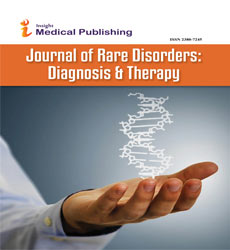Psychosocial Interventions in Rare Disorders and its Examples
Franck Bourdeaut
Department of Child Health Research, University of Western Australia, Perth, Australia
DOI10.36648/2380-7245.10.3.166
Franck Bourdeaut*
Department of Child Health Research, University of Western Australia, Perth, Australia
- *Corresponding Author:
- Franck Bourdeaut
Department of Child Health Research, University of Western Australia, Perth,
Australia,
E-mail: franck@gmail.com
Received date: May 29, 2024, Manuscript No. IPRDDT-24-19490; Editor assigned date: May 31, 2024, PreQC No. IPRDDT-24-19490 (PQ); Reviewed date: June 14, 2024, QC No. IPRDDT-24-19490; Revised date: June 21, 2024, Manuscript No. IPRDDT-24-19490 (R); Published date: June 28, 2024, DOI: 10.36648/2380-7245.10.3.166
Citation: Bourdeaut F (2024) Psychosocial Interventions in Rare Disorders and its Examples. J Rare Disord Diagn Ther Vol.10 No.3:166.
Description
Rare disorders, often defined as conditions affecting fewer than 200,000 individuals in the United States or 1 in 2,000 people in the European Union, present unique challenges for patients, families and healthcare providers. These conditions, also known as orphan diseases, encompass a diverse array of genetic, neurological, metabolic and immunological disorders. Due to their rarity, patients with rare disorders often face significant medical, social and psychological challenges, necessitating comprehensive and tailored psychosocial interventions. This article process the psychosocial dimensions of living with a rare disorder and discusses effective intervention strategies to support affected individuals and their families. Living with a rare disorder can have profound psychosocial implications, including emotional, social and psychological challenges. These impacts stem from several factors. Patients with rare disorders frequently experience prolonged periods of uncertainty and frustration due to delayed diagnosis or misdiagnosis. This diagnostic odyssey can lead to feelings of anxiety, hopelessness and frustration. Due to the rarity of these conditions, there is often a lack of accessible information and specialized medical expertise. Patients and their families may struggle to find reliable resources and knowledgeable healthcare providers.
Psychosocial interventions
Psychosocial interventions for rare disorders require a holistic and individualized approach that addresses the diverse needs of patients and their families. Key components of these interventions include:
Psychological support and counseling: Providing access to psychological support and counseling is essential for addressing the emotional and psychological challenges associated with rare disorders. Therapists and counselors can offer coping strategies, emotional support, and interventions to manage anxiety, depression and stress.
Support groups and peer networks: Facilitating support groups and peer networks can help patients and families connect with others facing similar challenges. These groups provide a sense of community, reduce feelings of isolation and offer a platform for sharing experiences and information.
Educational and informational resources: Developing and disseminating educational resources tailored to specific rare disorders is essential. This includes providing accurate medical information, treatment options and guidance on navigating the healthcare system.
Care coordination and advocacy: Rare disorder patients often require care from multiple specialists. Care coordination services can help streamline communication between healthcare providers, ensuring comprehensive and integrated care. Advocacy efforts can also raise awareness, influence policy and improve access to resources.
Case studies and examples
To illustrate the effectiveness of psychosocial interventions, consider the following case studies. In a multidisciplinary approach, a patient with DMD received psychological counseling to address anxiety and depression. The family participated in a support group, connecting with other families affected by DMD. The healthcare team provided educational resources on the latest treatments and coordinated care among neurologists, cardiologists, and physical therapists. Genetic counseling helped the family understand the inheritance pattern and consider future family planning options. A patient with a rare autoimmune disorder experienced social isolation due to the unpredictability of their condition. The intervention included joining an online support group, where the patient connected with others who understood their experiences. A social worker assisted the patient in accessing financial resources and applying for disability benefits. Psychological counseling helped the patient develop coping strategies to manage anxiety and improve their quality of life. Geographic and financial barriers can limit access to specialized psychosocial services, particularly in rural or underserved areas. Psychosocial interventions play a critical role in addressing the complex and multifaceted challenges faced by individuals with rare disorders and their families. By providing emotional support, fostering community connections, offering educational resources, and coordinating care, these interventions can significantly improve the quality of life for patients and their caregivers. Overcoming barriers to access and awareness is essential to ensuring that all individuals with rare disorders receive the comprehensive support they need. As research and awareness of rare disorders continue to grow, the development of tailored psychosocial interventionswill remain a vital component of holistic care for this vulnerable population.
Open Access Journals
- Aquaculture & Veterinary Science
- Chemistry & Chemical Sciences
- Clinical Sciences
- Engineering
- General Science
- Genetics & Molecular Biology
- Health Care & Nursing
- Immunology & Microbiology
- Materials Science
- Mathematics & Physics
- Medical Sciences
- Neurology & Psychiatry
- Oncology & Cancer Science
- Pharmaceutical Sciences
